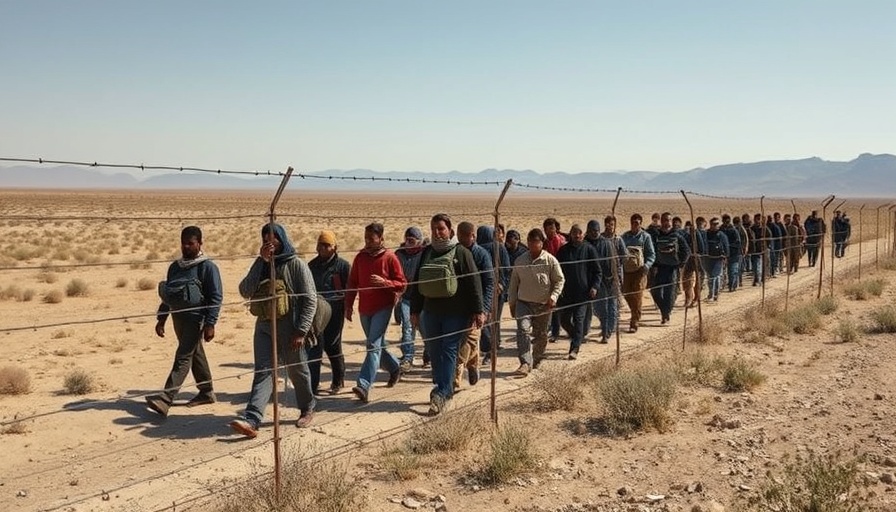
Analyzing the Migrant Crisis: Greece’s Emergency Measures Explained
In a significant turn of events, Greece's Prime Minister has declared emergency measures in response to an overwhelming influx of migrants, particularly on the island of Crete. Over the weekend, more than 2,000 migrants landed on this picturesque Mediterranean isle, pushing the total number of arrivals this year to over 10,000, as reported by Coast Guard figures. This situation has prompted the Greek government to implement stringent policies aimed at managing this sudden spike in migration and safeguarding national integrity.
In 'Greece blocks asylum claims after surge in migrant arrivals,' the discussion dives into the complexities of migration policy amidst a humanitarian crisis, exploring key insights that sparked deeper analysis on our end.
The Push for Strict Migration Policies
Prime Minister's announcement to the parliament communicated a clear message: the passage to Greece is effectively closed. Migrants entering Greece illegally will face arrest and immediate detention. This stern approach seeks to deter both traffickers and potential migrants, sending a short and persuasive message that the high cost of seeking refuge in Greece may lead to significant losses. By resorting to these emergency measures, the government intends to curb human trafficking and illegal migration, reinforcing border security amidst growing regional tensions.
Context Behind the Surge: A Broader Look at Migrant Dynamics
The immediate spike in migrant arrivals coincides with a complex backdrop of international relations. Recent diplomatic disputes within the European Union, coupled with the ongoing humanitarian crisis in Libya, have created the perfect storm for rising migration numbers. Eastern Libyan authorities have expelled EU ministers, intensifying tensions and complicating the EU's response to the migration crisis. As such, Greece finds itself at a critical frontline, grappling with the chaotic spillover effects of conflicts in North Africa and the Middle East.
Implications for Refugees and Asylum Seekers
Greece's decision has drawn mixed reactions, particularly from humanitarian organizations and refugee advocates. The suspension of asylum claims for those arriving by sea raises profound ethical questions about the treatment of vulnerable populations seeking refuge from war, persecution, and poverty. Critics argue that such measures violate international human rights obligations, while defenders contend that the government is prioritizing national security and public order in an unprecedented situation.
The Broader Impact of Changing Migration Policies Across Europe
The actions taken by Greece are not isolated; they reflect a broader trend among European nations in adjusting migration policies amid rising pressure. As various governments grapple with their own migrant challenges, including spikes in asylum claims and emergency situations, the implications of Greece’s measures could influence similar policies elsewhere in Europe. The interconnectedness of these challenges means that a united European stance on migration may become increasingly difficult to achieve, particularly with rising internal nationalism and calls for stricter immigration controls.
Future Predictions: A Shift in Migrant Trajectories?
Given the recent policy changes, what does the future hold for migrant trajectories in the Mediterranean region? Analysts predict potential shifts in migration patterns as individuals reassess the viability of their routes to Europe. With Greece tightening its borders, asylum seekers might redirect towards less monitored pathways, leading to increased dangers at sea and exploitation by human traffickers seeking to capitalize on desperation. Moreover, the impact of Greece's stance may embolden other nations along the migration route to adopt similar measures, perpetuating a cycle of deterrence and humanitarian crises.
The Role of the International Community: A Call for Solutions
The response to Greece's actions necessitates broader engagement from international organizations and the European Union. Collaborative efforts are essential to create sustainable solutions addressing the root causes of migration, including poverty, conflict, and climate change in migrants' home countries. Only through a collective approach can Europe hope to manage migration effectively while upholding humanitarian values and protecting human rights.
As we reflect on Greece's situation amidst this escalating crisis, it is essential for both policymakers and the public to remain informed about the complexities surrounding migration in Europe. This issue demands urgency and thoughtful engagement as we confront both the humanitarian obligation to support those in need and the pressing need to ensure national security.
In the face of growing challenges, how should nations balance their responses to migration with respect for human rights? This debate continues to unfold as Greece's policy shifts prompt a reevaluation of European migration strategies.
 Add Row
Add Row  Add
Add 




Write A Comment